Since the recent Anti-Colonial Anarchism or Decolonization poster went viral I’ve been privileged, as the poster’s maker, to take part in several conversations it has provoked. In multiple instances, I’ve seen statements from euro-american people who don’t like being called “white” and imagine a “post colonial” or “post decolonized” future.
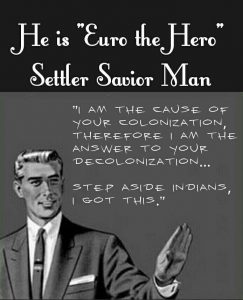 This isn’t the first time I’ve heard these ideas, and they are problematic for a number of reasons. I’de like to share why I believe this.
This isn’t the first time I’ve heard these ideas, and they are problematic for a number of reasons. I’de like to share why I believe this.
The challenge around whiteness and decolonization is this: no matter how much people of european heritage decolonize, or transform themselves through ancestral recovery into more “traditional” identities and relationships, white privilege and euro-centrism remain dominant paradigms – especially in so-called “america”.
Indigenous people and other people of color see that we still privilege from this system of white supremacy. In fact, because of white privilege, it is very possible that our movements of recovery will be heard “louder” or given more emphasis than those of Native people on their own lands. This injustice will only create more hard feelings, and we must find the complicated path of remaining true to our own healing without further marginalizing others.
This is why I, and many others, believe that decolonization necessitates authentic solidarity with Indigenous people in resistance to colonialism. This is also why I am moving further and further away from using the word “decolonization” except within a context that feels authentic. As awakening white people who still retain the benefits of white privilege, we are uniquely positioned to navigate the uncertain borders between Indigenous resistance movements and white society, educating, healing, and inspiring our fellow white people to engage in transformative movements and authentically support Indigenous resistance and survivorship against colonization and genocide.
We have a responsibility to do more than connect with our ancestors. While important, this is only one meaning and movement of this decolonization. There is much more to deep decolonization including healing the relationships between our peoples and Indigenous peoples.
If we believe that we are all connected, especially as settlers on stolen Indigenous lands still under resistance, then we must realize we are a long way from any sort of post-colonial/decolonized world.
The colonial wars against Indigenous people and Mother Earth have never stopped, they are ongoing. While the names have changed, the pursuit for more land and riches is the same. Refusing to engage in this conflict by pretending we have evolved or decolonized beyond colonialism is complete disassociation. It is not real.
Let us be honest with ourselves. As people of european heritage, we have 2000+ years of our own colonization and historic traumas to undo, much less face the genocidal legacy created by our ancestors over the last 520+ years. Colonialism, imperialism, neo-liberal capitalism and corporatism are not forces of the past – they are vigorous and expanding as I write. This means we have a multi-generational journey ahead for us and our peoples to resist the destruction of life, heal historic and present-day traumas, and recover the sacred aspects of culture that cry for renewal. We are only one part of this multi-generational story that will be spoken by the wind and waters for eternity.
Yes, there are times I bristle at being called “white”. I recognize “white” is not a culture, and in fact symbolizes a lack of cultural identity beyond euro-american supremacy. This does not describe who I am and how I live in the world.
I know and have relationships with my ancestors. I am learning my ancestral language. I know where I come from and have walked those lands. I am reclaiming old traditions and understandings. My Native family recognizes this healing and growth in the understanding of who I am. Despite all of this, I will forever remain “white” to most. The painful legacy of our people is just too great to earn an automatic pass from those we have systematically murdered and victimized.
I realize I will always be proving myself through my thoughts, words, and actions with Indigenous people and other People of Color who resist colonization and white supremacy. I may not like it, but I accept it is my responsibility during this time of profound change. It is a responsibility I humbly accept knowing that I grow my heart and understanding with each awkward and uncertain step.
After all, white culture has been demanding that Native people and other people of color prove themselves ever since its arrival. As I seek to be recognized for who I am in Indigenous spaces, it’s just that the shoe be on the other foot now.
I hope you will consider these words in your own life, and in your own awakening process. We cannot evade our past, we cannot forget in the present, and we must not divert our futures by perpetuating our dysfunction.
For people of amer-european heritage, decolonization is the dismantling of whiteness and white supremacy and the healing of relationships with those living beings – human and otherwise -who have been hurt by our disconnection and dysfunction. It is uncertain ground we walk on, but ground we must walk none the less. In honor of our ancestors who are still with us, let us walk this uncertain ground with open hearts and generous spirits so we may have the wisdom to understand what needs to be done, and the integrity to put that understanding into action.
Get the latest updates and resources...
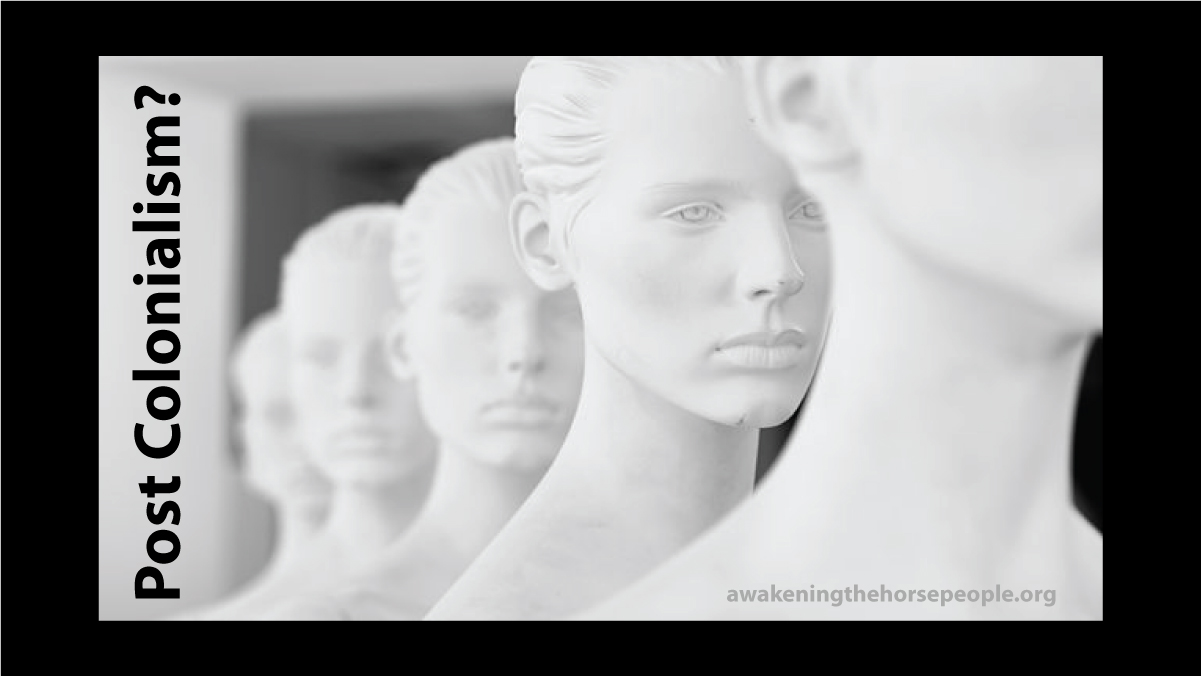
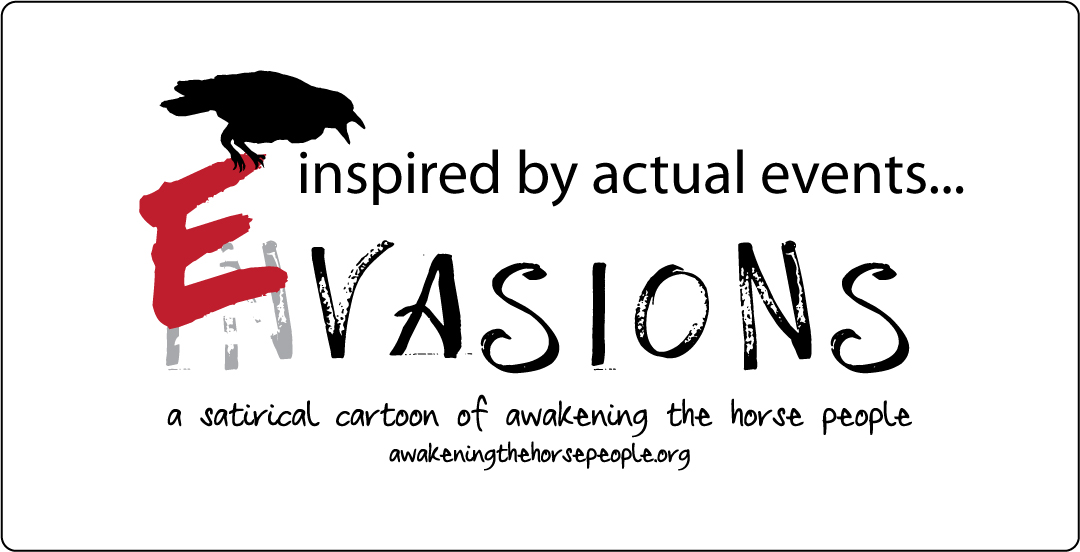
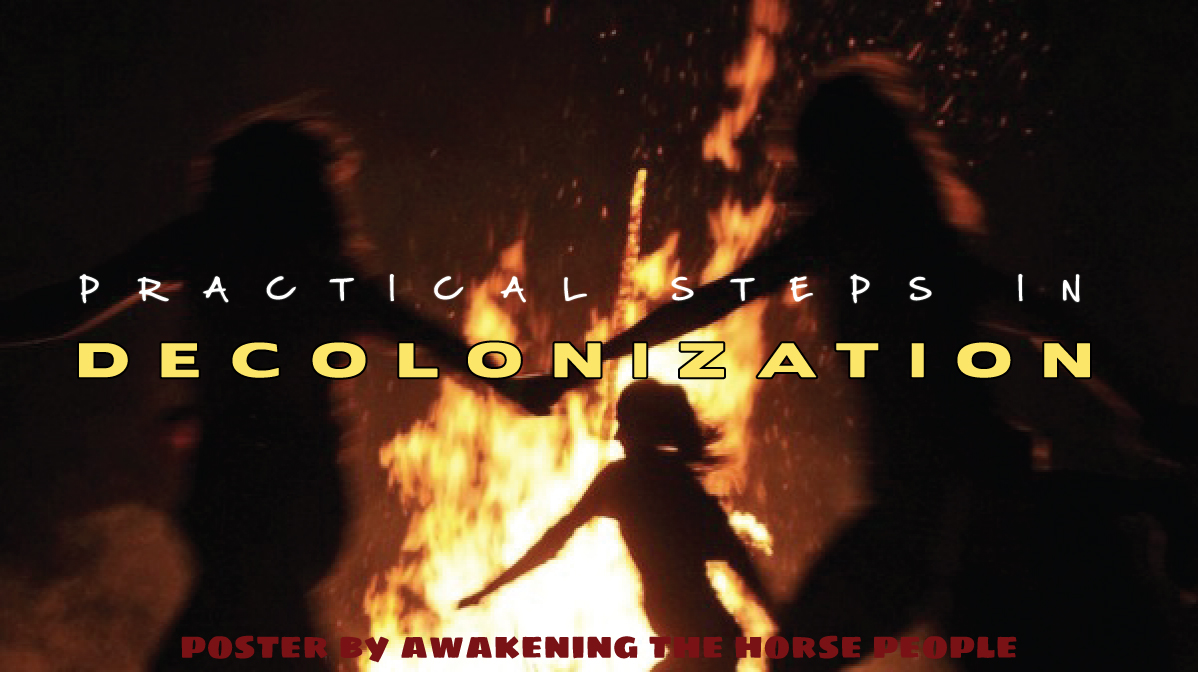
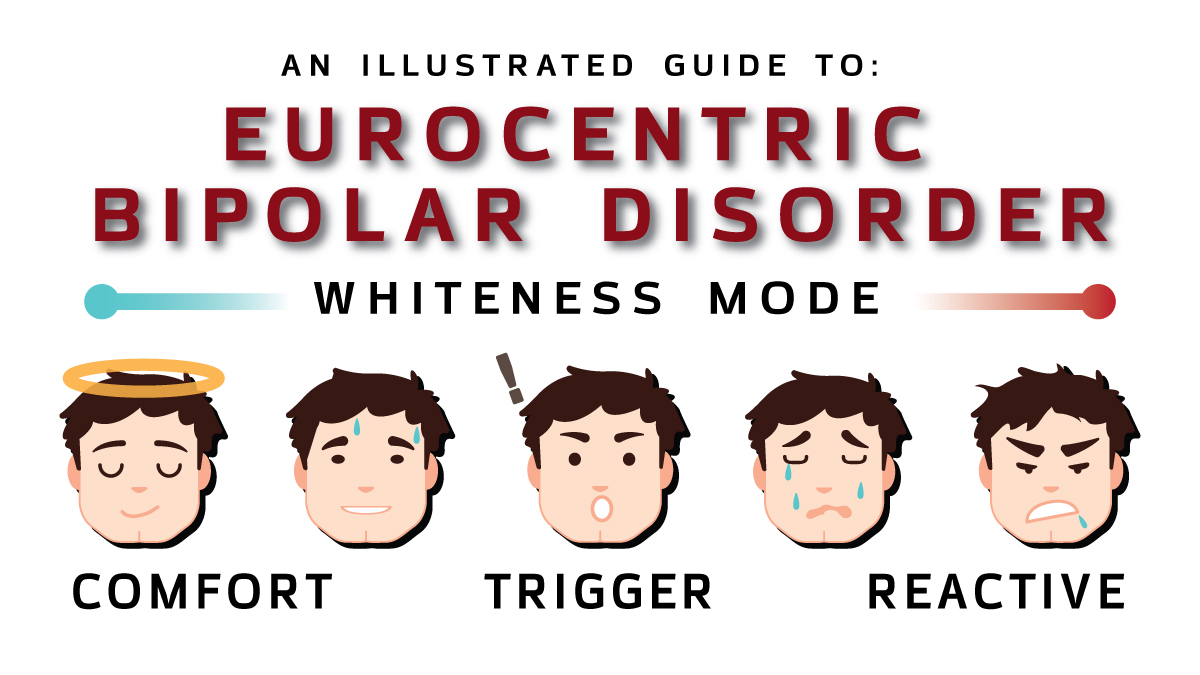
Thank you. I feel this. I too am a white person for whom “white” doesn’t tell the whole story, and even erases my Mexican heritage. “White” isn’t everything that I am, ethnically, culturally, or as an individual. But it is ONE thing I am, and in a white supremacist world it is a very meaningful something that needs to be reckoned with. White people have so much healing work to do, for ourselves and our communities and with the world…. It’s daunting. But we have to do it. We can’t skip over it and call the world post-racist, post-colonial and pretend it’s done. For ourselves and the generations to come and the world, we just can’t.
Reblogged this on Anishinaabek Windwriter.
You make some very important points Anna. I particularly resonate to your comment, “we have 2000+ years of our own colonization and historic traumas to undo, much less face the genocidal legacy created by our ancestors over the last 520+ years.” Working as a therapist supporting Native peoples in trauma healing until my recent retirement, I was powerfully impacted by the recognition of intergenerational & historic trauma impacting those of us of European descent. Although I am not a “true believer” in the scientific paradigm by any means, I find it very interesting that the research of the last 10-15 yeas in epigenetics and neurobiology are supporting and explaining how trauma impacts not only shape our brains, perceptions and behaviors, but can and are passed intergeneration ally.
If one looks at the so called, W.I.E.R.D. research (White-industrialized-educated-rich-democratic), one is struck by how white people (Europeans, white Americans, etc.) are outliers of the majority of humanity in many of areas studied, i.e. sense of individuality versus collective identity, etc. Not surprisingly white Americans prove to be the “outliers of the outliers,” on many factors. When combined with the fact that over 90% of research psychology subjects come from the small group, 12% segment of earth’s population, we can more easily see how twisted the lens becomes that we “white people,” view the rest of humanity and ourselves. Our beliefs about “human nature,” are powerfully influenced by our own “2000+ years” of “our own colonization and historic traumas.”
The impacts of endless war, the Holy Inquisition, the Crusades, the witch burnings, the Colonial genocide of Native peoples have created an unexplored labyrinth of intergenerational trauma in “white people,” that distorts and shapes our most basic perceptions of reality, human nature and our connections to each other and mother earth. My own decolonization journey is intimately tied to exploring this violent traumatic past and it’s relationship to the present. We have a parallel journey to make with our colonized and traumatized Native brothers and sisters, in facing and deeply exploring and working toward healing from the past trauma history that made colonization possible in the first place. This journey cannot be wished away, or circumvented. Like all grief work, the only way forward is through it.
A big thanks for sharing your experiences and contributing to this conversation. This is the kind of understanding the blog hopes to share and create conversation around. Would you consider creating a guest blog entry with what you shared here?
Hi Anna, I would love the opportunity to write a post addressing some of “science” emerging relating to trauma impacts and intergenerational transmission and possible connections to our “Western” concepts of human nature. My wife Annie and I are traveling and visiting family all over the west and mid-west over the next 6 weeks, so I can’t promise a quick response, but I will provide you with something within a few weeks. Thank you for the invite, and thank you for creating this discussion. Annie and I have felt so alone with these issues and it is wonderful to feel part of a community of people who are willing to think, feel, explore and share together. Warm regards. – Gary
Thank you for this important level of sharing. I live and teach in an indigenous community/region. I have struggled with my own positionality when it comes to historical trauma’s impact I bear witness to and too, as a white social worker who also teaches indigenous adult college students. I strive to stay open as the sometimes breathtaking realizations hit me about my own history which, as you say, involve a grief process that cannot be wished away. I allow that it is a struggle that will engage me for the rest of my life. I really appreciate this site (although to be honest, the white on black layout is hard on my eyes.)
Thanks for sharing a little of your story here. It’s really important that more people here these kinds of stories and reflections. Would you consider writing up a guest post with these reflections?
And, thanks – with the recent feedback, a new color scheme for the layout is likely on the way. 🙂
Yes, I would be happy to write something reflective about this exploration. I can’t get to it right now, but will have much more time in May. Thank you for suggesting it! When I prepare that…who do I send it to?
Wonderful and thank you!
You can send it to decolonizebizi [at] riseup.net.
fantastic!
Ana
Hi Diane, Thank you for your response and insights. I appreciate your struggles as a fellow white social worker working with indigenous peoples and living with the awareness and sensitivity you have to history and truth. As I learned more about the boarding schools and their traumatic impact, along with ever present racism, broken treaties and outright genocide, I have struggled with how to bring this awareness into the conversations and relationships I had in Native Alaska where I worked. I found that as I took the risk to share my thoughts and observations about my culture and the pain and suffering it has inflicted on indigenous cultures around the world, that some powerful things happened. My own grief work around the intergenerational trauma in my own family and culture became a foundation from which to communicate with new candor with my Native co-workers and clients. I began to speak more and more openly about what I see as the pathology in my traumatized and traumatizing culture, honoring the Native experience that my people were and are tied directly by this trauma trail to the current suffering of those same Native co-workers and clients. This felt to me like an important “owning” of my history, my privilege, and my relationship to the current suffering of indigenous peoples everywhere. This ownership seemed to help open a door between the worlds of my Native co-workers and clients and mine as a white male that lead slowly to much deeper levels of dialogue and finally to collaboration on trainings about trauma and historical trauma. I now find myself thinking that my current journey is bound with this exploration of trauma within the West, and working to create dialogue about it within the “white” community. I wish you the best in your work and efforts as a teacher and healer. Your heart will lead you. Warmest regards. – Gary
Gary: Your comment is one I will cut and paste into a word document so I can read it a number of times to absorb it. Rarely have I read commentary with the necessary subtlety and detail along with authenticity from a white male addressing colonization from a firmly personal stance. But imagine my surprise that this comes from your work in Alaska…I am in Alaska too, in Yup’ik country for the past 17 years. I write on “white” positionality and decolonization of social work. I will offer one insight that I continue to work with. Although I teach from Freirean, social justice/change models it took me time, soul searching, humbling errors to figure out I could not remain a bystander. As a social worker, my training was to be the helper. Cross cultural counseling textbooks had chapters on Native Americans, African Americans, Asian, etc. No chapters on “white people.” The assumption seemed to be that the white social worker is the helper and all “others” are the designated “client” replete with difficult issues.
Fast forward to my classes of all indigenous adult learners. Teaching a holistic model that includes elders with me for every class, naturally learning is done through one’s whole being—that includes emotion, sorrow, grief = LEARNING. So after a while I challenged myself. When I see my students express emotion in the classroom (and we are a deliberately safe space) did I see them as students or…clients? I realized that I saw them as clients. Because that is how I knew to define those who in my textbooks were always the client. I was humbled and I pushed myself to break it down. Easily now…I see them as my colleagues/peers. But there is so much more to go…
Well, it is late but I wanted to respond. I am grateful to have read your posts. Diane
Hi Diane, I’m blown away by the work you are doing, where you are doing it and how long you’ve been engaged with it. I wish I’d connected with you when I was still working in Alaska (my wife Annie and I retired one month ago – we’re heading to Europe to seek roots and explore “tribal” European history as best we can). There is so much I’d like to hear about your work and share about how working in Native Alaska opened and shaped and quite literally changed my life trajectories. Since we could do some “social work” talk that is a bit off topic from the overall focus of the wonderful site, I’d suggest we communicate by personal email if you’re open to that. My email address is . There is much I’d like to ask you about your work, as well as responding to your comments, but I’ll wait to hear back from you regarding how to best communicate. Warm regards. – Gary
Hi Gary. Your email will not appear so check your FB account 🙂 Be sure to look at your “other” messages.
I think the difficulty with ‘white’ people offering solutions is partly about privilege, but also about the very system which brought problems now trying to bring the solutions. As a person who grew up on a world which has always prioritized ‘whiteness’, I think letting to of the cultural arrogance that means we think we have nothing to learn from ‘others’ is an incredible start. The awareness though that we don’t have all of the answers and that there is a wonderful way of adding knowledge and insight into the human family humbles us (or it does me).
I think one of the big difficulties with ‘white’ people doing the work is the impact of racism. Racism sapped power and value from ‘other’ people and taught that only colonialism brought answers. I think there’s the need to say ‘no it didn’t, it (mis)educated people into colonial values and brought an epistemicide of alternate knowledges. Only that can break the yoke of colonialism, I think, when there is no need for ‘white’ intervention in order to be okay.
And yes, I think we do need to break down whiteness and make it strange, by looking at how it holds power and privilege and how that shifts and changes.
This is such an insightful article, thank you.
Reblogged this on Unsettling America.
Thank you for your engagement with settler colonialism and settler society. I am a white settter living in the Karuk Ancestral Territory. Here Indigenous culture is strong and settlers own most of the private land, the forest service by far owns most of the overall land and the land is “owned.” Bad scene yes but an articulate analysis of settler colonialism in action. People like me come back to the land to live a better life and have trouble accepting that we perpetuate and benefit from this system that seeks to destroy and erase Indigenous people and life. I have been conducting research on the white settler like myself trying to understand how settlers in the Karuk ancestral territory understand our role in the settler colonial system and cause an epistemological rupture in the ways that we know about whiteness and responsibility as human in the system of life. Your work is magically timed with the conversation on the Klamath. Much love and hoping to connect more!
Although long overdue I am so thankful that the time is now for these conversations between us settlers. I am really grateful for your words and understandings. Some of us have come together on the Klamath and are understanding ourselves collectively as settlers. As we engage with other settlers and try and forward an ethic of white settler accountability we are faced with a difficult task. Your balance with being clear that settlers perpetuate and benefit from settler colonialism and approaching with a compassionate understanding of the trauma that we suffer from is helpful and beautiful. Thank you again.
Great poster & blog Ana!! As Robert Jensen says in “The Heart of Whiteness” – “If we claim to not be interested in race, we will most certainly end up tacitly supporting white supremacy by virtue of our unwillingness to confront it.”
Very thought-provoking post, thank you. I am interested in better understanding how this solidarity looks and works, and to what ends. Is this about Euro Americans leaving america, or forging more authentic relationships with native tribes? How can we dismantle ethnocentric power structures over which we have no control? How can we effectively alter our lives so that we are not automatically, unthinkingly benefitting from eurocentric privilege? How can we respectfully share the land and its relatives/resources with native tribes and peoples? How can we effectively share power with them in our daily lives? How do we decolonize our living when we are trapped in an ethnocentric capitalist economy? I would be interested in exploring and better understanding all of these angles of decolonization as a euroamerican settler on native American lands.
I’m not on facebook anymore, but I still like to come and visit this site every so often, because of my meme! Naw just kidding, I think what you are doing is inspirational and awesome.
Keep up the awesome work.
Giibwanisi